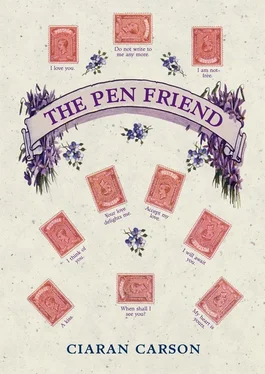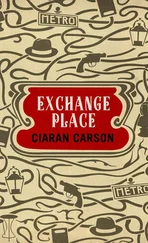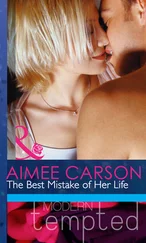When he discovered I was from Ireland, though, his attitude changed. Now his story was that he was waiting for the right person to buy it, he’d been waiting years. But most people, he said, were tourists, they did not appreciate these things, they did not esteem their proper value, which was not monetary, it was not even artistic, but spiritual. And he knew the Irish to be a spiritual race. You are Catholic? he asked. I nodded and shrugged uncertainly. Of course he’s Catholic, you said. He brought me to Easter Sunday Mass in Saint-Eustache, and you waxed lyrical to the old man about the ceremony, the incense and the music, the shafts of sunlight falling through the gloom from the tall high windows. And you are not Catholic? he asked you. No, you said, but I’m thinking of becoming one, it’s such a beautiful religion. Such a true religion, I mean, because it is true to our feeling that there is a world beyond this one, it has the beauty of truth, you said. Yes, said the old man, you will be a Catholic, and you will marry this fine man, and your first child will be a son, and may the Holy Family look kindly on his birth. Alas, I never married myself, he said, and I have been waiting for this moment, for such a fine couple to discover this icon. And by now I was so implicated that I had to buy it, and I was happy to find an excuse to do so. The old man named a price: it did not seem exorbitant for something that was priceless, and I didn’t haggle. And when we examined it together in the light of day, its colours seemed to glow even more, with an undeniable authenticity, and we were proud of ourselves at having been the recipients of such a gift.
After Paris you had to go to London for a few days; I went on to Belfast, and the next morning I wrapped the icon in a silk handkerchief, put it in my pocket, and brought it to Beringer for him to see. I never told you this until now. Without saying anything, I took off the silk handkerchief, and handed him the precious object. Mm, he said, and looked at it carefully. Very nice, very nice indeed, he said, and he took out his loupe and went over to the light of the window, and looked at it again, examining it in detail. Then he looked at the back, and at the front again. Yes, he said, lovely, masterly, I might say. Beautiful work. I was smiling proudly. But of course, he said, and he paused before delivering the blow, it’s a fake. The smile fell from my face. Oh, don’t be too hard on yourself, Mr Gabriel, it’s still a lovely piece of work. Whoever made this, he did everything right, proper techniques, done in the old style, well, except for a few little things. And he held the icon up. See the way the panel is convex? Yes, that’s because it was cut from an oak barrel-stave, I said. It was one of the things which had convinced me about it. Oak barrel-stave, correct, said Beringer, that’s what it is. But look at this, he said, and he showed me the back of the panel. What? I said. Well, said Beringer, if you look at the saw-cuts, they’ve been made with a modern power-saw, a circular saw, and they didn’t have saws like this in when, oh, 1700 or so, whenever this might have been made, were it the genuine article. And here’s another thing. He turned the panel over to show the image. See this strip of paint running around the edge? Yes, I said. I’d loved that little detail, a strip of dark rust red that framed the scene and somehow lifted it into another dimension.
Well, said Beringer, and he took a long, nicotine-stained thumbnail to it, and lifted off a tiny piece of the paint — Don’t worry, he said, the whole thing’ll come off by itself anyway in a matter of months, here, feel this, he said, and he passed me the tiny rust-red flake. Feel it, he said. Doesn’t it feel like a plastic film? Yes, I said reluctantly. That’s because it is, said Beringer, it’s modern acrylic paint. But outside of those little details, why, it’s a lovely piece of work, you have to admire the man that made this, oh, he knew what he was doing. And for all we know, maybe it was made for a genuine market, for a true believer. What does it matter if it’s old or new, so long as it’s done in the right way? I nodded ruefully. And might I ask, Mr Gabriel, how much you paid for it? I named the price. Oh, good price, good price. Though of course were it the real McCoy, you could maybe multiply that by ten. Or twenty. Still, you can consider it a bargain. You’ve got yourself something special. You’ve gone with your instincts, and that’s what you should always do, you have to trust yourself, said Beringer, even if you’re wrong. Because if you don’t trust yourself, who will?
I have the icon before me as I write, Nina, the icon that we placed against the mirror of the vanity unit in Room 412 in Hôtel Scribe, admiring it at intervals throughout our week in Paris. Lee Miller had stayed in Room 412, David Scherman was next door, 410 or 414, you didn’t know which. Though I expect it must have changed since then, you said, and in any event, maybe this 412 is not what 412 was then, because when you asked the concierge if this was Lee Miller’s room, the Lee Miller who was here during the liberation, he shrugged, and said, Who knows? The Liberation was a long time ago. But try and picture it as it was then, you said, pretend it is Lee Miller’s room. There’s her camera case hanging on the door knob, can’t you see it? It’s a Rolleiflex case, the camera itself is on the dressing table, over there, among the jars and bottles of perfume and chemicals, and there’s a table in the middle of the floor with a Hermes Baby typewriter on it, and a half-empty bottle of cognac, and a full ashtray, and piles of paper, there’s all sorts of junk overflowing from the drawers and wardrobes, cases of K rations piled up against the walls, cases of cognac and fine wines, the whole lot buried under cartons of flash bulbs, you said, and I began to join in the game. There’s loot everywhere, I said, everything from lace to leather, the iron bed is strewn with books and German military crests and silver ashtrays with swastikas on them, and binoculars and pistols and bayonets, and there’s a pair of jackboots in the corner, and a silver candelabra. And there’s half-a-dozen jerrycans of petrol out on the balcony. Petrol? you said. Oh, I am sorry, Lee, I meant gasoline, I said. I’d been putting on an American accent. I guess I’ve been too long away from good old Uncle Sam, I said. And who might you be? you said. Why, if you’re Lee Miller, then I must be David Scherman, I said. Don’t be too sure of that, you said, Lee Miller had a lot of lovers. And for a moment I was piqued. Then I caught the mischief in your expression, and I said, Well, can I be Monsieur X, then? And you said, Who shall I be then? Madame Y? No, you can keep on being Lee Miller if you like, I said. Snap, you said, and you winked at me with your left eye. The L’Heure Bleue you’d put on earlier had faded, and we went to bed in an imagined aura of cognac, photographic fluids, cardboard boxes, gasoline and gunmetal. Parfum Exotique .
Leonardo da Vinci observes that if you look at a damp-stained wall long enough, you will begin to see landscapes in it, adorned with mountains, rivers, rocks, trees, valleys, and so on. And you will also see fleeting figures, and strange expressions of faces, and people dressed in outlandish costumes. The effect, says Leonardo, is like listening to a carillon of bells, in whose clanging you may discover every name and every word you can imagine. So when last night a surveillance helicopter perched itself for some hours in the sky above Ophir Gardens, I could hear the syllables of your name, Nina, repeated in the washing-machine spin-cycle noise of its engines. Then I would hear my own name, Gabriel, then both our names together, Gabriel, Nina, Gabrellianina, till they would become scrambled and garbled back into the meaningless chaos from whence they had come.
Читать дальше












